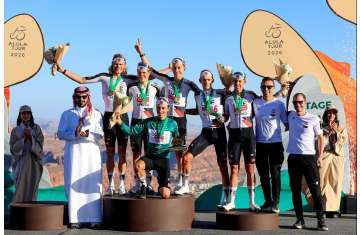In the presence and patronage of Sheikh Nahyan bin Mubarak Al Nahyan, Minister of Tolerance and Coexistence, the first UAE Conference on Organ Transplantation for Cancer Patients, organised by the Emirates Oncology Society in cooperation with (Houston Methodist) for Global Health Services, kicked off today, Saturday, in Abu Dhabi.
This is the first time that this conference has been held in the Middle East.
The conference is a great opportunity to attract specialists in the field of oncology, cancer and organ transplantation from the UAE, the countries of the region and the world, to Abu Dhabi as it is one of the most important destinations for medical tourism in the region.
Some 1,500 specialists from inside and outside the country participated in the conference through personal and virtual attendance. Major countries presented their clinical experiences and latest therapeutic innovations, the most important of which are America, Canada, Britain and Saudi Arabia, while the conference presented 24 discussion sessions and more than 50 research papers.
In his opening speech to the conference, Sheikh Nahyan bin Mubarak said: "I am pleased to be present at this distinguished conference, which is being held for the first time in the Middle East, and brings together leading regional and international experts in cancer prevention, examination, diagnosis and treatment, to identify the challenges facing successful treatment of cancer, and to discover solutions and innovative actions that will enhance healthcare.
He also appreciated the role played by these conferences in promoting medical research, exchanging knowledge and experiences, and providing opportunities for continuing medical education in the UAE and the region, stressing that medical practice of international quality is a global endeavour that all health entities are keen to achieve, and that successful medical innovations go far beyond Essential to any geographic boundary, this conference will help medical professionals stay abreast of the latest research and cutting-edge best practices in the field.
Sheikh Nahyan added: “Years ago, the late Sheikh Zayed bin Sultan Al Nahyan noticed that everything that the nation achieves depends on the good health of its people. The wise leadership of President His Highness Sheikh Mohamed bin Zayed Al Nahyan, inspired us in dealing with health.” Public services, medical services and medical education are basic priorities in our country, and under the leadership of His Highness and his directives, our country is fully committed to providing the best health care and medical education in our region, and leaving a mark on the global arena through our achievements and progress in the medical sector in a short period.
He stressed that organ transplantation for tumor patients is an innovative and promising method for treating cancer patients and gives them hope for recovery, especially patients with liver cancer, as this method has shown great potential globally to prolong the lives of patients and reduce the pain and suffering they live in. According to doctors, it is possible to remove the organ affected by cancer and replace it with a healthy organ in order to overcome the limitations of current surgical techniques and increase the survival rate from 20 percent to more than 80 percent for patients with primary liver cancer.
The conference aims to shed light on organ transplantation for cancer patients as one of the new and accurate specialties in the world, while focusing on cancer patients who suffer from cancers in the liver section and how transplanting a new disease-free organ is a hope for the complete recovery of these patients.
The expertise of the Methodist Centre is one of the most international experiences in the field of organ transplantation for cancer patients and their participation in this conference is helping to bring that knowledge to our Arab region.
The experts participating in the conference reviewed the ways in which cancer patients can be selected to benefit from this treatment, and the methods for developing technologies for these transplants, which are considered modern, which contributes to reducing the chances of cancer recurrence and reducing the expected side effects of organ transplantation for cancer patients.
The use of these methods was also discussed.
The recent advances in blood DNA tests for cancer cells for early detection of the risks of possible recurrence of cancer after transplantation, monitoring of side effects, and how to live with long-term complications that may accompany cancer patients.
During the conference sessions, the participants discussed the challenges facing organ transplantation for cancer patients, such as the lack of donors and the priority given to patients awaiting organ transplantation, and the use of immunotherapy with cancer patients. The conference also included panel discussions on the challenges and solutions of how to implement organ transplantation as a type. It is one of the basic types of treatment in the Arab region, and the success cases of patients who have applied organ transplantation treatment have been reviewed in countries that provide this type of treatment.
Prof. Humaid Al Shamsi, President of the Emirates Oncology Society and Chairman of the Conference, said: " We are honoured that Abu Dhabi will serve as the venue for this significant event, which will take place in the UAE for the first time ever in the Middle East, as we seek to provide all advanced and necessary treatments and reduce patients' need for travel and treatment abroad.
The presence of many experts in the fields of oncology and organ transplantation helped to broaden their knowledge and familiarise them with the most recent treatment options currently being used around the world in order to improve their application and help lower infection rates. The region's developed and avant-garde organ transplantation nations are hopeful that this meeting will accomplish its intended objectives.

Comments